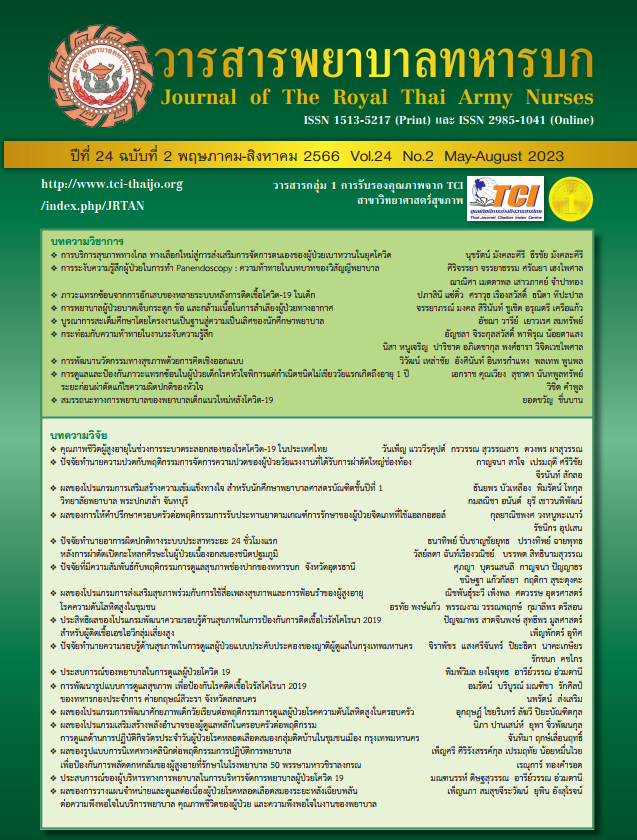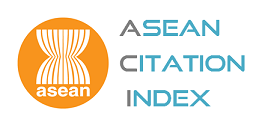ผลของโปรแกรมเสริมสร้างพลังอำนาจของผู้ดูแลหลักในครอบครัวต่อ พฤติกรรมการดูแลด้านการปฏิบัติกิจวัตรประจ�าวันผู้ป่วยโรคหลอดเลือด สมองกลุ่มติดบ้านในชุมชนเมือง กรุงเทพมหานคร
คำสำคัญ:
เสริมสร้างพลังอำนาจ, ผู้ดูแลหลักในครอบครัว, พฤติกรรมการดูแล, ผู้ป่วยโรคหลอดเลือดสมองบทคัดย่อ
การวิจัยกึ่งทดลองแบบ 2 กลุ่ม วัดก่อนและหลัง มีวัตถุประสงค์เพื่อศึกษาผลของโปรแกรมเสริมสร้างพลังอำนาจ ต่อพฤติกรรมการดูแลด้านการปฏิบัติกิจวัตรประจำวันของผู้ดูแลหลักในครอบครัวผู้ป่วยโรคหลอดเลือดสมองกลุ่มติดบ้าน แนวคิดการเสริมสร้างพลังอำนาจของกิบสันเป็นกรอบแนวคิด กลุ่มตัวอย่าง 76 คน เป็นผู้ดูแลหลักในครอบครัวของผู้ป่วย โรคหลอด เลือดสมองกลุ่มติดบ้านที่มีอายุ 18-60 ปี อาศัยในชุมชน กรุงเทพมหานคร สุ่มเลือกโดยการจับฉลากแบบไม่ใส่คืน กลุ่มละ 38 คน เก็บรวบรวมข้อมูลโดยใช้แบบสอบถามข้อมูลทั่วไป แบบสอบถามการรับรู้พลังอำนาจของผู้ดูแลหลัก แบบสอบถามพฤติกรรมการ ดูแลด้านกิจวัตรประจำวัน และโปรแกรมเสริมสร้างพลังอำนาจ โปรแกรม 6 สัปดาห์ ออกแบบเพื่อเสริมสร้างพลังอำนาจ ด้านการปฏิบัติกิจวัตรประจำวันแก่กลุ่มทดลอง โดยจัดกิจกรรมกลุ่มแลกเปลี่ยนประสบการณ์การดูแล ให้ความรู้ โรคหลอดเลือดสมอง สาธิตการปฏิบัติการดูแล สะท้อนคิดพฤติกรรมการดูแล แจกคู่มือ เยี่ยมบ้าน ติดตามทางโทรศัพท์ และส่งข้อความสั้น วิเคราะห์ข้อมูลด้วยสถิติทดสอบที และวิเคราะห์ความแปรปรวนร่วม
ผลการศึกษา พบว่ากลุ่มทดลองมีคะแนนเฉลี่ยพฤติกรรมการดูแลด้านกิจวัตรประจำวันผู้ป่วยโรคหลอดเลือดสมอง กลุ่มติดบ้านมากกว่ากลุ่มควบคุม อย่างมีนัยสำคัญทางสถิติ (p < .01) และมีคะแนนเฉลี่ยพฤติกรรมการดูแลด้านกิจวัตรประจำวัน ผู้ป่วยโรคหลอดเลือดสมองกลุ่มติดบ้านมากกว่าก่อนได้รับโปรแกรมฯ อย่างมีนัยสำคัญทางสถิติ (p < .01)
Downloads
เอกสารอ้างอิง
National Health Security Office. A handbook of long-term public health care systems for the elderly in the area. Bangkok: National Health Security Office; 2016. (In Thai)
Siangpror K. Health education and health behavior. 2nd ed. Bangkok: Chulalongkonmahawitthayalai; 2019. (In Thai)
Traitawin U. The effects of caregivers empowerment program on bangban district, Phra nakhon si ayutthaya province. Association of Preventive Medicine of Thailand Journal. 2018; 8(2): 268-80. (In Thai)
Doungchan N, Sinprasert P, Throngthieng W, Wanchai A, Sutthilax C, Banlengchit S. Stroke in older people and guidelines for strengthening caregivers. Journal of The Royal Thai Army Nurses. 2021; 22(1): 20-8. (In Thai)
Suwatcharangkoon S. Thai Stroke Society. Bangkok. Charnsanitwong Printing limited Company, 2019. (In Thai)
Division of Public Health Nursing. Statistics of the family caregiver in Bangkok. 2020. (In Thai)
Rangsa J, Rodjakpai Y, Pongsangpan P. Effect of empowerment program for caregivers and elderly patients with diabetes in Kantharwichai District, Mahasarakham Province. Srinagarind Medical Journal. 2016; 31(6): 377-87. (In Thai)
Nakkul N. The delopment of a care model for home-bound and bed- bound chronically ill patients in suratthani municipality. Nursing Journal of the Ministry of Public Health. 2018; 32(1): 813-20. (In Thai)
Panthong P, Patisena T. The empowerment of caregivers for rehabilitation of stroke patientsat Maharat Nakhon Ratchasima Hospital. Journal of Disease Prevention and Control. 2018; 24(2): 57-66. (In Thai)
Naewbood S. Effect of empowerment program on self-care ability of a Family caregiver. Journal of Nursing and Education. 2015; 8(4): 30-40. (In Thai)
Bureau of Policy and Strategy, Ministry of Public Health. Thailand public health statistics. 2018. (In Thai)
Gibson C. The process of empowerment in mothers of chronically ill children. Journal of Advance Nursing. 1995; 21:1201-10.
Pengsa-ium V, Chaiyasung P, Pongsupasa V, Jumjana S. The development of caregiver’s empowerment program of bed bound elderly in the community. Journal of Nursing and Education. 2017; 18(3): 83-95. (In Thai)
Chumsri S, Chaimongkol N, Sananreugsak S. Effects of the child caregiver’s empowerment promoting program on ability and burden to care for children with cerebral palsy. The Journal of Faclty of Nursing Burapha University. 2014; 22(4): 35 - 46. (In Thai)
Etemadifar S, Bahrami M, Shahriari M, Khayeri F, Masoudi R, Afzal SM. The family centered empowerment program can relieve stress anxiety and depression of heart failure patients’ family caregivers. World Family Medicine. 2017; 15(10): 99-104.
Payrovee Z, Kashaninia Z, Mahdaviani SY, Rezasoltani P. Effect of family empowerment on asthma control in school-age children. Tanaffos. 2017; 17(1): 47-52.
Yoo HK, Kim GH. An empowerment program for family caregivers of people with dementia. Public Health Nursing. 2019; 222-33.
Attaprajong J, Jewpattanakul Y, Krainuwut K. Effects of family members’ empowermentprogram on family members’ food preparing behaviors for elderly diabetic patients. Chulalongkorn Medical Journal. 2020; 64(1): 87-94. (In Thai)
Paksee N, Sriapo-ngam Y, Monkong S, Leelacharas S. Effects a transitional care program stroke patients and family careivers on caregiver’s prepareness, stress adaptat ion, and satisfaction. Ramathibodi Nursing Journal. 2016; 22(1): 65-80. (In Thai)
Denise F. Polit, Cheryl T Beck. International differences in nursing research, 2005-2006. JONS. 2009; 41(1): 44-53.
Jaywan P, Nantachaipan P, Thongchai C. Effects of empowerment on perceived caring capabilities among caregivers of patients with traumatic brain injury. Nursing Science Journal of Thailand. 2016; 43: 95-106. (In Thai)
Luecha A, Sminoy S, Kanachai V, Buphahou S, Tarachun R. The effectiveness of group empowerment program on caregivers of the elderly with dementia. Journal of Suicide Prevention of Thailand. 2020; 1(1): 41-56. (In Thai)
Pangkam N. Effects of empowerment program on caregiver pediatrics’ with congenital heart disease who were post operations for complicated prevention. J. Com. Health Dev. Quarterly Khon Kaen University. 2017; 5(4): 625-41. (In Thai)
ดาวน์โหลด
เผยแพร่แล้ว
รูปแบบการอ้างอิง
ฉบับ
ประเภทบทความ
สัญญาอนุญาต
ลิขสิทธิ์ (c) 2023 วารสารพยาบาลทหารบก

อนุญาตภายใต้เงื่อนไข Creative Commons Attribution-NonCommercial-NoDerivatives 4.0 International License.
บทความหรือข้อคิดเห็นใดใดที่ปรากฏในวารสารพยาบาลทหารบกเป็นวรรณกรรมของผู้เขียน ซึ่งบรรณาธิการหรือสมาคมพยาบาลทหารบก ไม่จำเป็นต้องเห็นด้วย
บทความที่ได้รับการตีพิมพ์เป็นลิขสิทธิ์ของวารสารพยาบาลทหารบก
The ideas and opinions expressed in the Journal of The Royal Thai Army Nurses are those of the authors and not necessarily those
of the editor or Royal Thai Army Nurses Association.







